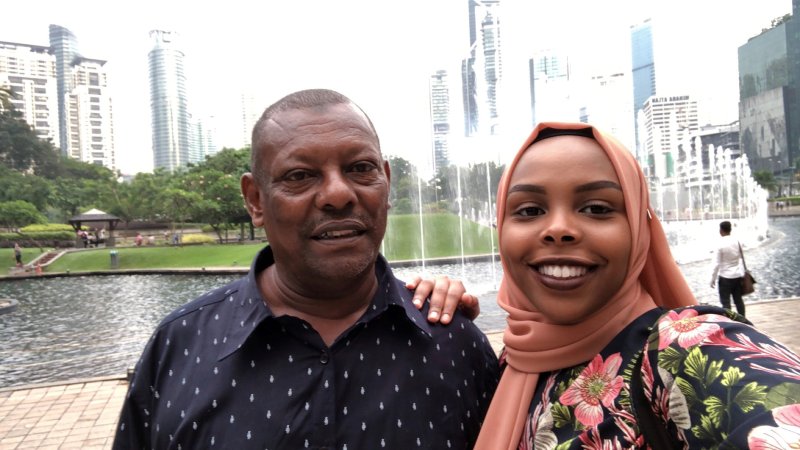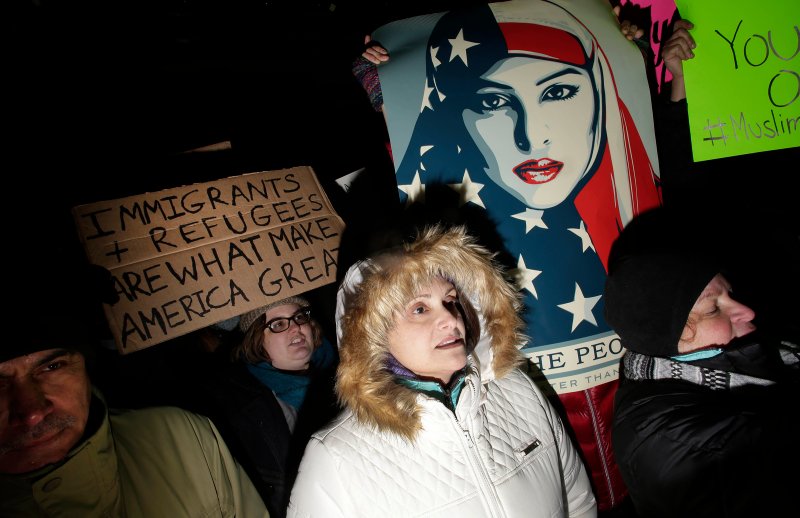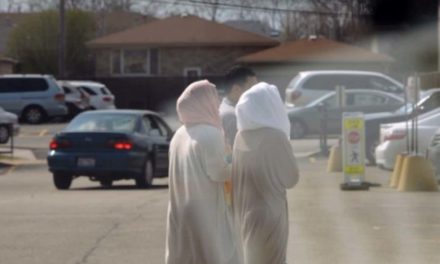Photo Credit:
Getty Images, Afnan Salem & WMJ
Afnan Salem’s father, a Somali citizen living in Malaysia, has been waiting three years for United States immigration authorities to allow him to come to Ohio to live with his family. But Trump’s severe travel restrictions on many visas for those with citizenship from more than a dozen predominantly African and Muslim-majority countries, including Somalia, means he is, at least temporarily, barred from entry.
Under previous Administrations, Salem’s father would likely have been able to come to the U.S. without complications: Salem’s brother is a U.S. citizen and has filed for a visa on their father’s behalf. Trump’s travel ban—often referred to as the Muslim and African ban—changed that calculus, making it much more difficult, and often impossible, for family members from certain predominately Muslim and African countries to gain entry to the U.S.
Salem, a Somali-American 22-year-old student at Ohio State University, says the stringent restrictions send a message to her and those like her that Africans and Muslims are not welcome in the U.S, that “you don’t have the right to be reunited with your family because of your faith or where you come from.”
President-elect Joe Biden, who is expected to be inaugurated on Jan. 20, 2021, has promised to revoke the Trump-era travel ban on his first day in office—a commitment that families like Salem’s are desperately hoping he follows through on.
Even before President Donald Trump issued his first executive order attempting to establish a ban just about a week after his inauguration, he had called on the campaign trail for a “total and complete shutdown of Muslims entering the United States,” and falsely declared that “Islam hates us.” It was in this context that Trump began issuing executive orders to keep many Muslims from entering the U.S. (The first was introduced January 2017.) The first few early iterations of a travel ban were struck down by lower courts, but the Supreme Court upheld a recent version in 2018.
The impact of the travel restrictions has been far-reaching. Between Oct. 1, 2015 and Sept. 30, 2019 there was a decrease of 79% in visas issued to Iranians, 74% for Somalis and 66% for Yemenis, according to The Bridge Initiative, a research project based in Georgetown University that focuses on Islamophobia. In Jan. 2019, the libertarian Cato Institute reported that the new restrictions had already prevented more than 15,000 spouses and adopted children of U.S. citizens from joining their spouses or parents in the U.S. In Michigan, a Yemeni-American father and U.S. citizen Mahmood Salem committed suicide after his wife and two of his five children in Djibouti were denied visas under Trump’s travel ban to join him in the U.S., NBC reported.
“Each time the Muslim ban was reintroduced, it carried the same discriminatory intent, but changed its language and process in hopes that the courts would allow it to stand,” says Max Wolson, a staff attorney at the National Immigration Law Center.
The most recent version of Trump’s ban includes more countries than the original version—and places varying degrees of restrictions on the types of U.S. visas citizens from these countries can apply for. The citizens of 13 countries are impacted: Iran, Libya, Somalia, Syria, Yemen, Venezuela, North Korea, Nigeria, Myanmar, Eritrea, Kyrgyzstan, Sudan and Tanzania.
Activists fighting to overturn the restrictions have stressed the importance of recognizing that the measure is not just a Muslim ban but also targets African citizens. Six of the countries included in the ban are in Africa, and the greater weight given to the continent is intentional and fits in with Trump’s derogatory rhetoric (like “sh-t hole countries”) towards Africans, says Asha Noor, a racial justice and immigration advocate. “It’s the perfect storm of Islamophobia and anti-Blackness.”

A restrictive waiver process
In May 2018, the U.S. embassy in Malaysia, where Salem’s father currently lives, told him after an interview that he would be “ineligible for a visa” but that they would review his eligibility for a waiver and that it could be a “lengthy process.” He applied for a waiver and has been waiting since.
To be approved for a waiver, immigration officials must determine that he satisfies three criteria: that his entry would not pose a national security or public safety threat, his arrival would be in the interest of the U.S. and that denying him entry would cause “undue hardship.” It’s an opaque process and a high barrier to reach.
The waiver provision is supposed to provide pathways for some immigrants from the affected countries to make it to the U.S. in attempts to dispel the notion the measure is a blanket ban targeting any particular religious or ethnic group. But the waiver program is a “farce,” says Wolson, with the National Immigration Law Center, which has sued over the specific provision and previously filed a lawsuit over the ban’s alleged unconstitutionality as a whole.
Immigration authorities declined almost three-quarters of all visa waivers between Dec. 2017 and April 2020 for all countries included in the travel restriction, according to The Bridge Initiative. Many of those trying to get a waiver have been denied on the basis of not facing sufficient hardship—even if they live in a conflict zone like Yemen, where a civil war continues. There are also supposed to be exceptions made for children to be reunited with parents but the definition of children is so narrow that it only applies to minors and excludes adult children, like Salem.
“The addition of the waiver program was…an attempt to setup a defense by claiming that it was not a ban because it could be waived,” Wolson says. “The reality is that the waiver program is designed to deny people waivers and the statistics have borne that out.”
The waiver provision was at least partly why the Supreme Court in 2018 allowed the measure to stand in a 5-4 ruling. The majority said in its opinion that there were “significant exceptions” for many foreign nationals, particularly for nonimmigrant visas and through the waiver process. They felt that the new restrictions had a “sufficient national security justification” even as more than 55 former officials who served under both political parties, including former secretaries of state, CIA directors, and other top intelligence officials, told the court that it would be counterproductive for national security.
The fight continues
Even with Biden’s victory, for activists like Linda Sarsour, the threat of discrimination does not disappear. “Our community is always on edge,” says Sarsour, the Palestinian-American activist executive director of MPower Change, a Muslim grassroots movement that has been advocating to overturn the travel restrictions for years. “We’re never going to be able to relax—even under a Biden administration,” she says. Sarsour is aware that because of the Supreme Court’s ruling, there’s nothing stopping any presidential administration after Biden from imposing the same sweeping restrictions in the name of national security. So she’s working to ensure Congress passes the No Ban Act, which would limit the scope of the current restrictions, so that they only apply to cases in which the Secretary of State has identified particular circumstances and credible facts that justify exclusion. The legislation would repeal all versions of the ban, as well as limit executive authority to prevent any future presidents from issuing similar bans. (It has passed the Democrat-led House but not the Republican-led Senate.)
There’s also work to be done for families who have already tried but failed to reunite in the U.S. Subha Varadarajan, legal and outreach fellow for the No Muslim Ban Ever Campaign, says that under a Biden administration, they will be pushing to ensure that those denied entry due to the ban have an opportunity to be reconsidered for admission under pre-existing vetting processes. “A lot of these families have been waiting for years, so there needs to be a process to expedite those admissions,” Varadarajan says.
For those who have already been able to permanently reunite and live with their family members in the U.S., it’s often because they have access to key support, which can be difficult to find. “We have seen that—disproportionately—having the media or a congressperson take an interest in your case makes your likelihood of getting through significantly higher,” Wolson says.

Rooting out Islamophobia
Syrian-American Ramez Alghazzouli believes public pressure from a Huffington Post article about the hardship he faced because of being unable to have his wife join him in the U.S. for three years was instrumental in her attaining a successful visa. (The story was published less than a month before his wife received a visa, he says.)
Although the couple live together in Arizona now and just celebrated the birth of the first child, the travel restrictions will always be a part of their relationship and their time in the U.S., Alghazzouli says. “This can destroy a human being,” he says. ”I’m not an emotional guy but it distracted and destroyed me.”
For many Muslims, the real issue behind the travel restrictions is Islamophobia. Khaled Beydoun, a law professor at Wayne State University, warns against “only understanding Islamophobia through the Muslim ban” and remains skeptical about just how much Biden will do to root out systemic Islamophobia. “The Biden administration won’t engage in the same kind of Islamophobia as Trump does” but we may see a continuance of bombing countries like Yemen, Afghanistan and Pakistan, as well as sweeping domestic surveillance programs that target Muslims.
After all, it was under the Obama and Biden administration, that the US Department of Homeland Security launched a surveillance program that many Muslims and civil rights advocates say targets Muslims. The Biden campaign has said it would end a similar counter-terrorism program, as well as “conduct a thorough review of past programs and regularly consult with leaders from historically targeted communities, including Arab Americans, to ensure that civil rights are protected.”
It remains to be seen how Biden will address issues of foreign policy and surveillance but there’s no doubt that lifting the restrictions on mostly Muslim and African travelers would bring thousands of separated families relief. “If Biden wins and doesn’t actually get rid of the ban, I’m willing to go knock on the White House door and say ‘you promised us,’” says Alghazzouli, the Syrian-American who was separated from his wife for three years.
As for Salem, she is in her senior year of university, studying international relations, and has been thinking about becoming an immigration lawyer so she can help reunite families. With Biden’s victory, she hopes that her father can make it to the U.S. in time for her graduation in summer.














